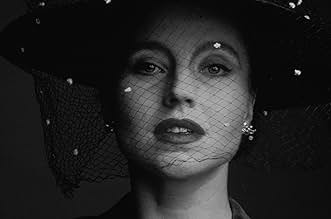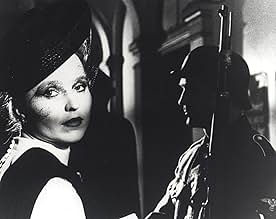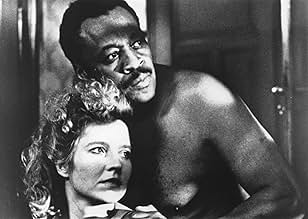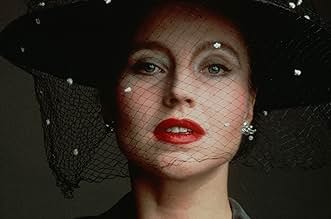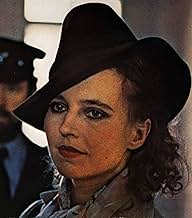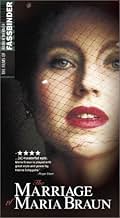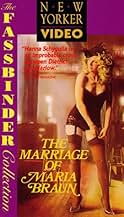IMDb-BEWERTUNG
7,7/10
15.839
IHRE BEWERTUNG
Eine Witwe aus dem Zweiten Weltkrieg versucht, sich an das Leben im Nachkriegsdeutschland anzupassen.Eine Witwe aus dem Zweiten Weltkrieg versucht, sich an das Leben im Nachkriegsdeutschland anzupassen.Eine Witwe aus dem Zweiten Weltkrieg versucht, sich an das Leben im Nachkriegsdeutschland anzupassen.
- Auszeichnungen
- 13 Gewinne & 7 Nominierungen insgesamt
George Eagles
- Bill
- (as George Byrd)
Günter Lamprecht
- Hans Wetzel
- (as Günther Lamprecht)
Empfohlene Bewertungen
We watched this film in our German Cinema class at university some years ago, and I still remember it well.
Without wishing to give too much away, it tells the tale of a woman who, seeing the desolate landscape that Germany was in 1945, determines to build herself a comfortable life and, as she does so, she becomes one of many women in Germany rebuilding the nation. This was a time, historically, when the women were a greater driving force in the social and economic rebuilding of the nation than were the men (who were both lacking in credibility following the horrors and the mess of the years past, and somewhat dazed by what the nation had just been through).
As she builds that life (and in so doing helps to rebuild the nation), however, she finds that she may have sacrificed too much.
It is a movie worth watching in order to gain some understanding of what life was like in Germany from 1945 to roughly 1970. Rainer Fassbinder makes use of images in places which show the transition of German society from broken ruins to economic superpower, the changing status of women in German society over that time period, the changing attitudes both within Germany and from outside toward Germany, and the sacrifices that women were prepared to make in order to build the Germany that they ultimately did. It also asks, though, if the single-minded pursuit of rebuilding the nation economically and materially did not take too much out of the nation and the people in other areas.
I enjoyed the movie, and am happy to recommend it.
Without wishing to give too much away, it tells the tale of a woman who, seeing the desolate landscape that Germany was in 1945, determines to build herself a comfortable life and, as she does so, she becomes one of many women in Germany rebuilding the nation. This was a time, historically, when the women were a greater driving force in the social and economic rebuilding of the nation than were the men (who were both lacking in credibility following the horrors and the mess of the years past, and somewhat dazed by what the nation had just been through).
As she builds that life (and in so doing helps to rebuild the nation), however, she finds that she may have sacrificed too much.
It is a movie worth watching in order to gain some understanding of what life was like in Germany from 1945 to roughly 1970. Rainer Fassbinder makes use of images in places which show the transition of German society from broken ruins to economic superpower, the changing status of women in German society over that time period, the changing attitudes both within Germany and from outside toward Germany, and the sacrifices that women were prepared to make in order to build the Germany that they ultimately did. It also asks, though, if the single-minded pursuit of rebuilding the nation economically and materially did not take too much out of the nation and the people in other areas.
I enjoyed the movie, and am happy to recommend it.
Having heard of this film for years, I didn't see it until 2003! Perhaps it's just as well that I waited. It is one of the finest films of its type -- post WW2 in Germany -- that I've ever seen; perhaps on balance the finest.
It seems to me that rather than being a cynical portrayal of those difficult years, it is more truthful and revelatory in a deep way. I imagine that no one other than those who lived then can begin to tell the story, which is why Fassbinder has tried on our behalf -- to try to convey to us the angst, the frustrations, the sadness, the insanity, the querulousness, the fragile hope of that era.
I find the story very sad, of course, because in my early-21st century psyche I'm more tuned into the love story than I am the tale of the sociology and social psychology of an era that occurred when I was very young. It seems to me that if one views the characters as representatives of some of the major "world views" obtaining during the reconstruction period, one sees a few of the many different human reactions there can be to such an experience: Many feel burned out and can't feel hope any longer; others, like Maria, feel there is at least money and position to be gained under the new dispensation; some simply don't care; others try to feed off the experience without contributing; and so on and so forth.
It also occurred to me that, at age 60, I may be in a position to appreciate this film more, and certainly to be more understanding of and sympathetic with the characters/types portrayed. I found each of them to have an important story to tell, whether it was a "good" story or not. And the character of the Black US Army Sergeant, while tragic at the end, was itself an essay in human relations that has to embarrass most Americans -- the fleeting moments when he and Maria found joy and pleasant times together were just wonderful to behold, and an indictment of our sad history in that regard.
View it and see what you think!
It seems to me that rather than being a cynical portrayal of those difficult years, it is more truthful and revelatory in a deep way. I imagine that no one other than those who lived then can begin to tell the story, which is why Fassbinder has tried on our behalf -- to try to convey to us the angst, the frustrations, the sadness, the insanity, the querulousness, the fragile hope of that era.
I find the story very sad, of course, because in my early-21st century psyche I'm more tuned into the love story than I am the tale of the sociology and social psychology of an era that occurred when I was very young. It seems to me that if one views the characters as representatives of some of the major "world views" obtaining during the reconstruction period, one sees a few of the many different human reactions there can be to such an experience: Many feel burned out and can't feel hope any longer; others, like Maria, feel there is at least money and position to be gained under the new dispensation; some simply don't care; others try to feed off the experience without contributing; and so on and so forth.
It also occurred to me that, at age 60, I may be in a position to appreciate this film more, and certainly to be more understanding of and sympathetic with the characters/types portrayed. I found each of them to have an important story to tell, whether it was a "good" story or not. And the character of the Black US Army Sergeant, while tragic at the end, was itself an essay in human relations that has to embarrass most Americans -- the fleeting moments when he and Maria found joy and pleasant times together were just wonderful to behold, and an indictment of our sad history in that regard.
View it and see what you think!
Alright already, get over it, was Handke's comment to the 1968 meeting of the Gruppe 48 -- those writers who wanted to "heal" from the war. Well Fassbinder doesn't want to heal, he wants to indict. And this movie, probably his most accessible, takes a woman as the symbol for the nation-- a theme common to prehistoric oral literature, particularly among the Irish, made famous by Grimmelshausen's Mother Courage and updated by Brecht's play. But in this version, instead of the tragic Mother trying to save her children and mourning them, Maria Braun sells out for comfort from collaboration with the Nazi's through the economic wonder "Wirtschaftswunder" of the cold war. This was Fassbinder's big hit, because he toned down his politics both sexual and marxist, to focus on the loss of soul that Germany experienced. It was also Hanna Schygulla's Oscar worthy performance, probably one of her best of many great ones. Like little Oskar from the Tin Drum, Maria Braun was stunted by the experience, only on the inside.
Allegory for postwar Germany...examination of modernist female sexuality...Marxist critique of human labor under capitalism...yada, yada. I won't bore you with that prattle. Which isn't to say those idea weren't baked into the movie or that you're wrong to see the movie as deeply philosophical. But it certainly isn't necessary to enjoying the movie.
The Marriage of Maria Braun is a great film without needing to be dissected as some dull academic thesis paper. Maria depicted quite spectacularly by Hanna Schygulla, she plays a character who I can't really decide is tragic or the real "villain." This is one of those weird films where every character is so endearing and well written that it's painful to see things go so off the rails for them.
Ending was a little obvious, and I could argue it was too dumb for the rest of the movie, but overall an amazing production.
The Marriage of Maria Braun is a great film without needing to be dissected as some dull academic thesis paper. Maria depicted quite spectacularly by Hanna Schygulla, she plays a character who I can't really decide is tragic or the real "villain." This is one of those weird films where every character is so endearing and well written that it's painful to see things go so off the rails for them.
Ending was a little obvious, and I could argue it was too dumb for the rest of the movie, but overall an amazing production.
A woman uses every means possible to survive hardship in post-war West Germany. In doing so she becomes financially successful but loses her soul in the process.
The Marriage of Maria Braun is a film that operates on two different levels. On the one hand in can be seen as a look at one woman's struggle against adversity in the hardships of the post war years. While on another, the film can clearly be read as a critique of the way the new Germany forgot it's awful past and sold it's soul in order to prosper in what would become known as the German Economic Miracle. This latter reading can be determined by reading the main narrative as an allegory in which Maria Braun represents the new Germany. She begins by prostituting herself to the Americans and ends very wealthy but emotionally dead; she forgets her past quickly in order to concentrate on her future.
There is no doubt that Rainer Werner Fassbinder put together a clever allegorical film here. And there is also no doubt that Hanna Schygula is very good in the lead role. But I did have difficulty with empathising with the people in this story, as none of them were particularly likable. Perhaps that was the point of course. But, whatever the case, the film left me cold unfortunately.
The Marriage of Maria Braun is a film that operates on two different levels. On the one hand in can be seen as a look at one woman's struggle against adversity in the hardships of the post war years. While on another, the film can clearly be read as a critique of the way the new Germany forgot it's awful past and sold it's soul in order to prosper in what would become known as the German Economic Miracle. This latter reading can be determined by reading the main narrative as an allegory in which Maria Braun represents the new Germany. She begins by prostituting herself to the Americans and ends very wealthy but emotionally dead; she forgets her past quickly in order to concentrate on her future.
There is no doubt that Rainer Werner Fassbinder put together a clever allegorical film here. And there is also no doubt that Hanna Schygula is very good in the lead role. But I did have difficulty with empathising with the people in this story, as none of them were particularly likable. Perhaps that was the point of course. But, whatever the case, the film left me cold unfortunately.
Wusstest du schon
- WissenswertesInspired by "Mutter Courage und ihre Kinder" (1938/39), a play by Bertolt Brecht, and Baby Face (1933).
- PatzerAt the end of the cut of the two kids blowing up the firecrackers, they start laughing but no sound is heard. The sound of laughter is heard on the next cut after they get yelled at by the man scavenging for wood.
- Zitate
Maria Braun: I'm a master of deceit: a capitalist tool by day, and by night an agent of the proletarian masses - the Mata Hari of the Economic Miracle.
- Crazy CreditsAt the very end of the credits the following persons are 'credited' by their picture: Konrad Adenauer, Ludwig Erhard, Kurt Georg Kiesinger and Helmut Schmidt and a disconnected phone line can be heard.
- SoundtracksIn The Mood
Written by Wingy Manone, Andy Razaf and Joe Garland
Top-Auswahl
Melde dich zum Bewerten an und greife auf die Watchlist für personalisierte Empfehlungen zu.
- How long is The Marriage of Maria Braun?Powered by Alexa
Details
- Erscheinungsdatum
- Herkunftsland
- Offizielle Standorte
- Sprachen
- Auch bekannt als
- The Marriage of Maria Braun
- Drehorte
- Produktionsfirmen
- Weitere beteiligte Unternehmen bei IMDbPro anzeigen
Box Office
- Budget
- 1.975.000 DM (geschätzt)
- Bruttoertrag in den USA und Kanada
- 8.144 $
- Eröffnungswochenende in den USA und in Kanada
- 11.623 $
- 16. Feb. 2003
- Weltweiter Bruttoertrag
- 11.869 $
Zu dieser Seite beitragen
Bearbeitung vorschlagen oder fehlenden Inhalt hinzufügen


